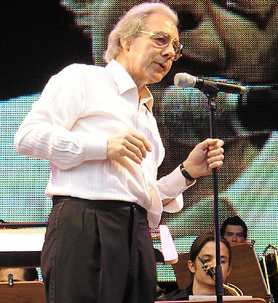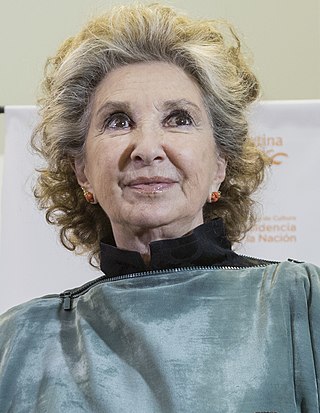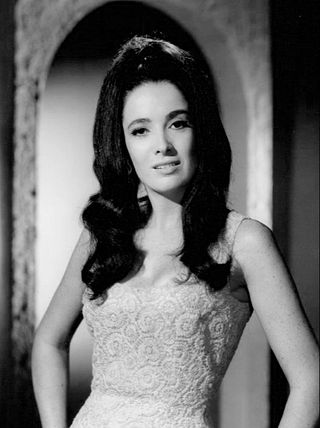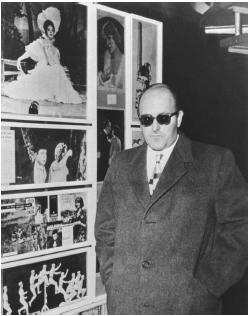A list of films produced in Argentina in 1970:

Mauricio Raúl Kagel was an Argentine-German composer and academic teacher.

Boris Claudio "Lalo" Schifrin is an Argentine-American pianist, composer, arranger, and conductor. He is best known for his large body of film and TV scores since the 1950s, incorporating jazz and Latin American musical elements alongside traditional orchestrations. He is a five-time Grammy Award winner; he has been nominated for six Academy Awards and four Emmy Awards.

A sexploitation film is a class of independently produced, low-budget feature film that is generally associated with the 1960s and early 1970s, and that serves largely as a vehicle for the exhibition of non-explicit sexual situations and gratuitous nudity. The genre is a subgenre of exploitation films. The term "sexploitation" has been used since the 1940s.

Norma Aleandro is an Argentine actress. She is considered one of the most celebrated and prolific Argentine actresses of all time and is recognized as a cultural icon in her home country.
León Klimovsky Dulfán was an Argentine film director, screenwriter and producer notable for his work during the classical era of Argentine cinema. He was known mainly for his work in Spanish cinema during the 1960s and '70s.

Narciso Ibáñez Menta was a Spanish theatre, film, and television actor. He developed much of his career in Argentina, during the Golden Age of Argentine cinema of the 1930s and 1940s.

Marta Victoria Moya Peggo Burges, known professionally as Linda Cristal, was an Argentine-American actress. She appeared in a number of Western films during the 1950s, before winning a Golden Globe Award for her performance in the 1958 comedy film The Perfect Furlough.

Cinema of Argentina refers to the film industry based in Argentina. The Argentine cinema comprises the art of film and creative movies made within the nation of Argentina or by Argentine filmmakers abroad.
The Mar del Plata International Film Festival is an international film festival that takes place every November in the city of Mar del Plata, Argentina. It is the only competitive feature festival recognized by the FIAPF in Latin America, and the oldest in this category in the Americas. The festival is organized by the National Institute of Cinema and Audiovisual Arts (INCAA).
This is an index to pages listing Argentine films ordered by year of release. For an A-Z list, see Category:Argentine films.

Kurt Landesberger was an Austrian born Argentine film director notable for his work during the classical era of Argentine cinema.

Fernando Ayala was an Argentine film director, screenwriter and film producer of the classic era. He is widely considered one of the most important Argentine film directors and producers in the history of the cinema of Argentina.

Pierre Bruno Hugo Fontana, otherwise known as Hugo del Carril, was an Argentine film actor, film director and tango singer of the Golden Age of Argentine cinema.

Enrique Carreras was a Peruvian-born Argentine film director, screenwriter and film producer. He was one of the most prolific film directors in the history of the cinema of Argentina and a prominent figure of the classical era of Argentine cinema.

Julio Porter was an Argentine screenwriter and film director known as one of the most prolific screenwriters and film directors in the history of the Cinema of Argentina and a notable figure of the classical era of Argentine cinema.

Armando Bó was an Argentine film actor, director, producer, screenwriter and score composer. He began his career as an actor and producer during the Golden Age of Argentine cinema of the 1930s and 1940s. In 1956, Bó met Isabel Sarli and cast her as the lead actress in his film Thunder Among the Leaves (1957), in which she made the first full frontal nude in the history of Argentine cinema. Bó and Sarli became both romantic and commercial partners, and the duo turned to the sexploitation genre in the 1960s and 1970s, these films being considered emblematic of the genre.

Leopoldo Torre Nilsson, also known as Leo Towers and as Babsy, was an Argentine film director, producer and screenwriter.

Mr. and Mrs. Juan Lamaglia is a 1970 Argentine film written by Héctor Grossi and Raúl de la Torre and directed by Raúl de la Torre.

The Copa Argentina, officially known as the "Copa Argentina AXION energy" due to sponsorship reasons, is an official football cup competition organized by the Argentine Football Association (AFA).

Argentina, officially the Argentine Republic, is a country in the southern half of South America. Argentina covers an area of 2,780,400 km2 (1,073,500 sq mi), making it the second-largest country in South America after Brazil, the fourth-largest country in the Americas, and the eighth-largest country in the world. It shares the bulk of the Southern Cone with Chile to the west, and is also bordered by Bolivia and Paraguay to the north, Brazil to the northeast, Uruguay and the South Atlantic Ocean to the east, and the Drake Passage to the south. Argentina is a federal state subdivided into twenty-three provinces, and one autonomous city, which is the federal capital and largest city of the nation, Buenos Aires. The provinces and the capital have their own constitutions, but exist under a federal system. Argentina claims sovereignty over the Falkland Islands, South Georgia and the South Sandwich Islands, the Southern Patagonian Ice Field, and a part of Antarctica.